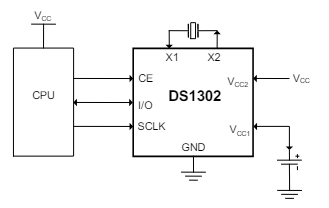
DS1302 Description
The DS1302 is a low-power, real-time clock (RTC) IC from Maxim Integrated to keep track of time and date in a variety of electronic systems. It features a 31 x 8 RAM for temporary data storage, a trickle-charge capability to support a backup power source, and a serial interface for communication with a microcontroller. The clock/calendar provides seconds, minutes, hours, day, date, month, and year information, and automatically adjusts for months with fewer than 31 days, including corrections for leap years.
DS1302 Operating Principle
The DS1302 operates as a real-time clock (RTC) with a calendar function, maintaining the time and date information continuously even when the main power supply is unavailable, thanks to its built-in trickle-charge feature for backup power. The device interfaces with a microcontroller through a simple serial interface, which allows for easy communication and control.
Internally, the DS1302 contains a 31-byte RAM for temporary data storage, and uses a binary-coded decimal (BCD) format to represent time and date values. It updates the time and date registers every second, and automatically accounts for leap years and months with fewer than 31 days. The trickle-charge circuitry allows for a backup power source, such as a supercapacitor or a rechargeable battery, ensuring the RTC continues to operate during power outages.
DS1302 Pinout

DS1302 CAD Models
Symbol

Footprint

3D Model

DS1302 Circuit

DS1302 Block Diagram

DS1302 Operating Characteristics

DS1302 Specifications
| Specification | Description |
| Supply Voltage | 2.0V - 5.5V |
| Operating Current | 1.2 µA (typical@2.0V) |
| Timekeeping Current | 300 nA (typical@2.0V) with battery backup |
| Interface | 3-wire synchronous serial |
| Clock Frequency | 32.768 kHz |
| RTC Accuracy | ±1 minute per month at 25°C with external crystal |
| Backup Supply Voltage | 2.0V - 5.5V |
| Data Retention | 10 years (with battery backup) |
| Temperature Range | -40°C - 85°C |
| Memory | 31 x 8-bit SRAM for user data |
| Alarm Function | No |
| Calendar Function | Century, year, month, date, day of the week, hours, minutes, seconds |
| Leap Year Compensation | Automatic up to year 2100 |
| Dimensions | 8-pin DIP, 8-pin SOIC |
| Package Options | 8-pin DIP (300 mil), 8-pin SOIC (150 mil) |
DS1302 Features
Completely Manages All Timekeeping Functions
31 x 8 Battery-Backed General-Purpose RAM
Simple Serial Port Interfaces for Most Microcontrollers
3-Wire Interface
TTL-Compatible (VCC = 5V)
Single-Byte or Multiple-Byte (Burst Mode)
Data Transfer for Read or Write of Clock or RAM Data
Low Power Operation Extends Battery Backup Run Time
2.0V to 5.5V Full Operation
Uses Less Than 300nA at 2.0V
8-Pin DIP and 8-Pin SO Minimizes Required Space
Underwriters Laboratories® (UL) Recognized
DS1302 Applications
Embedded System
Digital Clocks
Time Display Panels
Industrial Automation
Computers and Peripherals
Home Automation
Data Logging Devices
Automotive Applications
DS1302 Package
The DS1302 real-time clock (RTC) chip is available in two primary package options: the 8-pin Dual In-line Package (DIP) and the 8-pin Small Outline Integrated Circuit (SOIC).
The 8-pin DIP (300 mil) is a rectangular housing with two parallel rows of pins extending perpendicularly from the body, each spaced 2.54 mm apart. This package type is suitable for through-hole mounting, making it ideal for breadboard prototyping and applications where robustness is essential. The larger size allows for easier handling and soldering.
On the other hand, the 8-pin SOIC (150 mil) is a surface-mount package with a smaller form factor, having gull-wing leads for soldering directly onto the surface of printed circuit boards (PCBs). With a width of 150 mils, this package type is ideal for applications requiring a compact footprint, such as compact electronic devices and densely populated PCBs.
FAQs
How does the DS1302 communicate with a microcontroller?
The DS1302 communicates with a microcontroller using a simple serial interface (SPI), requiring three wires: RST (reset), SCLK (serial clock), and I/O (data line).
How much static RAM does the DS1302 have?
The DS1302 includes 31 bytes of static RAM for general-purpose data storage.
How do I set the time on the DS1302?
Time can be set on the DS1302 by writing to its registers via the serial interface, typically done during the initialization process in your microcontroller's firmware.
Does the DS1302 support daylight saving time adjustments?
The DS1302 itself does not have built-in support for daylight saving time adjustments. These adjustments need to be handled by the system's firmware.